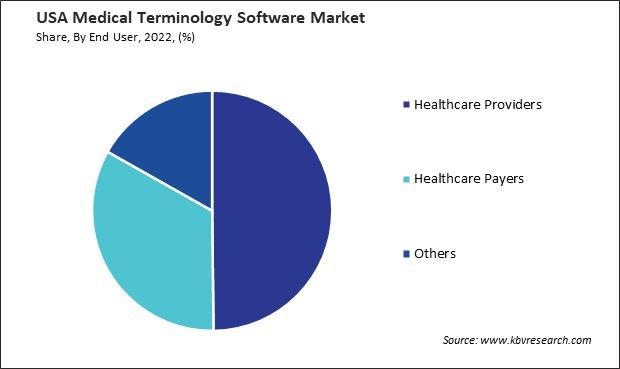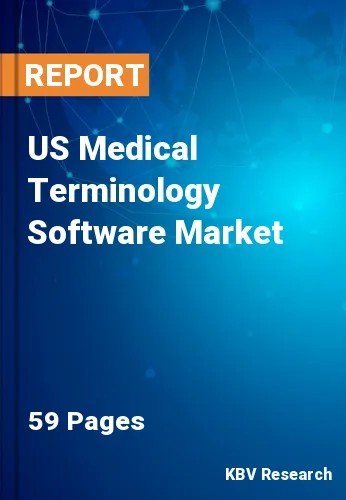The Medical Terminology Software Market size is expected to reach $565.03 million by 2030, rising at a market growth of 9.0% CAGR during the forecast period.
The medical terminology software market in the United States has witnessed substantial growth in recent years, driven by the increasing digitization of healthcare processes and the growing need for accurate and efficient communication within the medical field. As the U.S. healthcare industry continues to evolve, the demand for advanced technology solutions to streamline clinical workflows and enhance communication among healthcare professionals is rising.

The United States is witnessing a substantial surge in adopting electronic health records (EHR) within the medical terminology software market, marking a transformative shift in healthcare management. As healthcare providers increasingly recognize the benefits of digitizing patient information, EHR systems have become integral to streamlining and enhancing healthcare delivery. These electronic records promote seamless information exchange among different healthcare entities and contribute to better decision-making through data analytics and insights.
According to HealthIT.gov, as of 2021, approximately 88% of office-based physicians in the United States have embraced electronic health records (EHRs), with nearly 78% utilizing certified EHR systems. The adoption of certified EHRs among office-based physicians has shown a steady increase, rising from 74% in 2014 to the current rate of 78%. This growing reliance on EHRs underscores the evolving landscape of healthcare technology in the U.S. It highlights the expanding industry for medical terminology software as healthcare professionals increasingly integrate advanced electronic solutions into their practice for enhanced patient care and streamlined medical information management.
In the dynamic medical terminology software market in the United States, delivering high-quality patient care remains a paramount goal for healthcare professionals. Adopting advanced software solutions is pivotal in achieving this objective by enhancing communication, accuracy, and efficiency in healthcare settings. Healthcare providers across the U.S. increasingly rely on state-of-the-art medical terminology software to ensure precision and clarity in communication. These advanced tools play a pivotal role in reducing the likelihood of errors in medical documentation, ultimately contributing to more accurate diagnoses and treatment plans. The software's ability to maintain standardized terminology facilitates seamless communication among healthcare professionals, fostering collaboration and ensuring a comprehensive understanding of patient histories and conditions.
Moreover, in the United States, where healthcare regulations and compliance standards are stringent, medical terminology software ensures that healthcare organizations adhere to the latest guidelines. This compliance mitigates legal risks and reinforces the commitment to patient safety and confidentiality. Integrating artificial intelligence and machine learning into medical terminology software further bolsters its capabilities. These technologies assist healthcare professionals in extracting valuable insights from vast amounts of medical data, enabling personalized and data-driven patient care strategies. Hence, integrating advanced medical terminology software in the U.S. healthcare landscape ensures accuracy and efficiency and strengthens compliance, fostering a commitment to patient safety and confidentiality.
In the United States, the demand for accurate medical coding and billing within the medical terminology software market has witnessed a substantial upswing in recent years, driven by several key factors. The intricate nature of the healthcare system, coupled with the evolving regulatory landscape and the increasing focus on data accuracy and compliance, has propelled the need for advanced medical coding solutions. One of the primary drivers behind the surge in demand is the transition to the ICD-10 coding system, which was implemented to provide a more comprehensive and detailed classification of diseases and medical conditions. This shift has necessitated healthcare providers to adopt sophisticated medical terminology software that effectively navigate the complexities of the new coding standards, ensuring accurate billing and reimbursement processes.
Furthermore, the emphasis on value-based care and the shift from fee-for-service models have heightened the importance of precise medical coding and billing in the U.S. Healthcare organizations are under increasing pressure to optimize revenue cycles, reduce claim denials, and enhance overall financial performance. The COVID-19 pandemic has further underscored the significance of accurate medical coding and billing as healthcare systems grapple with an influx of patients and the need for rapid and precise documentation. The demand for software solutions that seamlessly integrate with electronic health records (EHRs) and support telehealth services has surged, reflecting the industry's digital transformation. Thus, the United States medical terminology software market is witnessing robust demand for accurate medical coding and billing solutions driven by regulatory changes, the shift to value-based care, and the ongoing digitization of healthcare processes.

The medical terminology software market in the United States is a dynamic and rapidly evolving sector, driven by the increasing complexity of healthcare systems and the need for efficient communication and interoperability within the industry. Several companies play pivotal roles in this industry, offering innovative solutions to healthcare providers, professionals, and organizations. One prominent player in the U.S. medical terminology software market is 3M Health Information Systems. 3M provides various software solutions to facilitate accurate clinical documentation and coding. Their solutions help healthcare organizations streamline workflows, reduce errors, and enhance coding efficiency, ultimately improving reimbursement and compliance.
Optum360, a subsidiary of UnitedHealth Group, is another key player in the medical terminology software market. Optum360 offers comprehensive medical and terminology solutions, including computer-assisted coding (CAC) systems. These technologies assist healthcare professionals in assigning accurate codes to medical procedures and diagnoses, ensuring proper reimbursement and adherence to coding standards.
Elsevier, a global information analytics company, has a significant presence in the U.S. medical terminology software market. Elsevier's clinical decision support tools, including medical terminologies and coding solutions, empower healthcare professionals with real-time information and evidence-based insights, contributing to better clinical outcomes.
Cerner Corporation, a leading health information technologies company, focuses on electronic health records (EHR) and clinical informatics. Their solutions integrate medical terminology standards, enabling seamless communication and data exchange among different healthcare systems and providers. Cerner's commitment to interoperability aligns with the broader industry push toward connected and collaborative healthcare ecosystems.
Athenahealth is recognized for its cloud-based services and solutions in the healthcare sector. The company offers medical billing and practice management solutions incorporating standardized medical terminologies, supporting efficient revenue cycle management for healthcare providers across the U.S.
Additionally, Intelligent Medical Objects (IMO) stands out as a company dedicated to developing and licensing medical vocabulary and mapping solutions. Their products assist healthcare organizations in capturing, normalizing, and sharing clinical data, fostering interoperability and enhancing the accuracy of health information.
By Application
By End User
Our team of dedicated experts can provide you with attractive expansion opportunities for your business.

